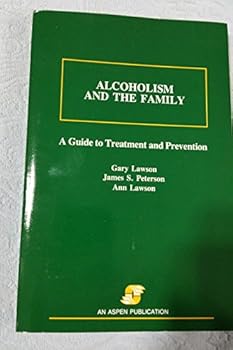Alcoholism and the Family
Select Format
Select Condition 
Book Overview
The second edition of this highly successful book takes the view that the family - not just the alcoholic member - is the client. This approach is now well accepted in psychological circles. Family therapists & students will use this book to learn about substance abuse from a systemic viewpoint & chemical dependency counselors will learn about family systems thinking & theory. This thoroughly revised book has additional models of evaluation, new models of treatment, ten years of research findings, & updated references. Includes an instructor's manual.
Format:Paperback
Language:English
ISBN:0871896060
ISBN13:9780871896063
Release Date:January 1986
Publisher:Aspen Publishers
Weight:6.00 lbs.
Customer Reviews
3 ratings
Excellent!
Published by Thriftbooks.com User , 16 years ago
Other than taking forever to receive (I was already half way through the semester and had bought the book again from my school) it was in excellent shape. It was worth the money. Now I can sell it back to the school.
For Grad Students and Other Professionals
Published by Thriftbooks.com User , 16 years ago
I obtained this book as part of my required texts for graduate school. I found this book to be an easy read for me as well as being a helpful guide as I put my new degree to work in the field.
Family therapists tackle alcoholism
Published by Thriftbooks.com User , 24 years ago
In the past, the problem drinker goes off for treatment, and the rest of the family was a secondary consideration. The authors propose a different perspective. Instead of just treating one member, treat the entire alcoholic family as the client. Each individual within the family structure should be an integral part of treatment, not just the drinking member. The author's treatment approach attempts to trace alcoholism back to it's root origins and describes how the problem is passed from generation to generation. The book describes many ways people perpetuate alcoholism, both consciously and unconsciously, and how it can be identified and treated. Specific procedures were included for prevention and for the diagnosis and treatment of the alcoholic family. The book was clearly written, and each chapter built upon the previous chapter, providing a lucid, sequential, and understandable text. The book was divided into four parts: (1) background; (2) etiology; (3) treatment; and (4) prevention. Part one is a review of alcoholism treatment and etiological theories. The controversial disease concept of alcohol was discussed first, followed by the physiological, psychological and sociocultural theories, respectively. The point was made that no one theory is correct, but rather, that all these factors contribute to the problem depending on individual circumstances. The Alcoholics Anonymous Model, Transactional Analysis Model and Behavioral Model of treatment were discussed, exclusive of other theories, and the authors ultimately suggest an eclectic approach. Treatment should fit the needs of the client and should be individualized. Part two dealt with etiology and proposed looking at the problem from the perspective of alcoholism as a family problem. Family therapy philosophy was reviewed, and the authors discussed the Communications Model, Systems Model, Structural Model and Social Learning Model. The importance of dynamics within the family of origin and the nuclear family was emphasized. Physiological, sociocultural and psychological theories of etiology were discussed, as well as the relevance of etiology for treatment and prevention. Part three dealt with treatment of the alcoholic family. It presented family therapy techniques that may be unfamiliar to the alcohol counselor and included techniques for family therapists who are inexperienced in working with alcoholic families. The authors present the view that the focus of treatment should be on the aspect of the family system that perpetuates the drinking behavior. This factor is unique in each family and should be evaluated without any preconceived notion about typical behavior patterns. Some of the topics discussed were family reports and therapist assessment of family structure; family therapy and A.A.; marital therapy; adolescent alcoholism; family violence; sexual dysfunction; children of alcoholics; art therapy; treatment of the alcoholic's spouse; and evaluation of family treatment. Lastly





